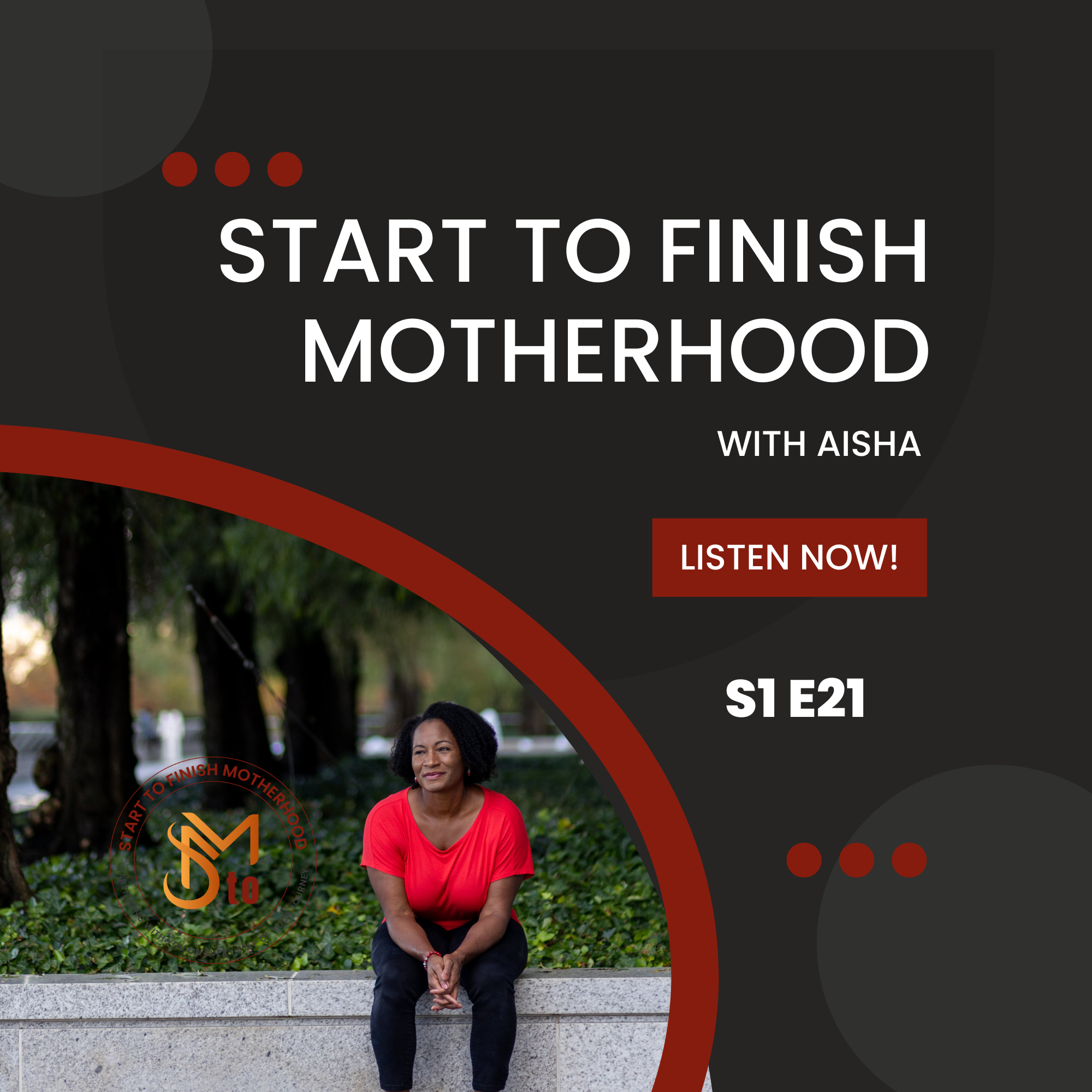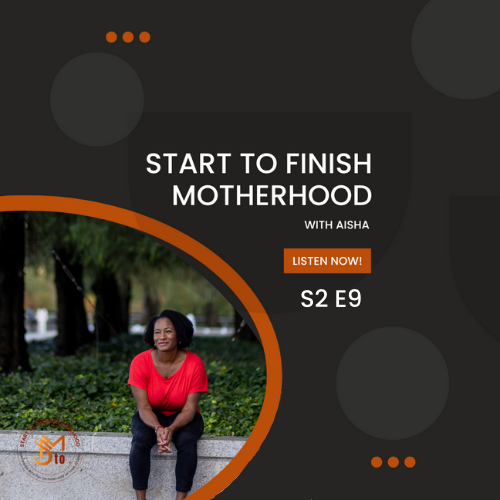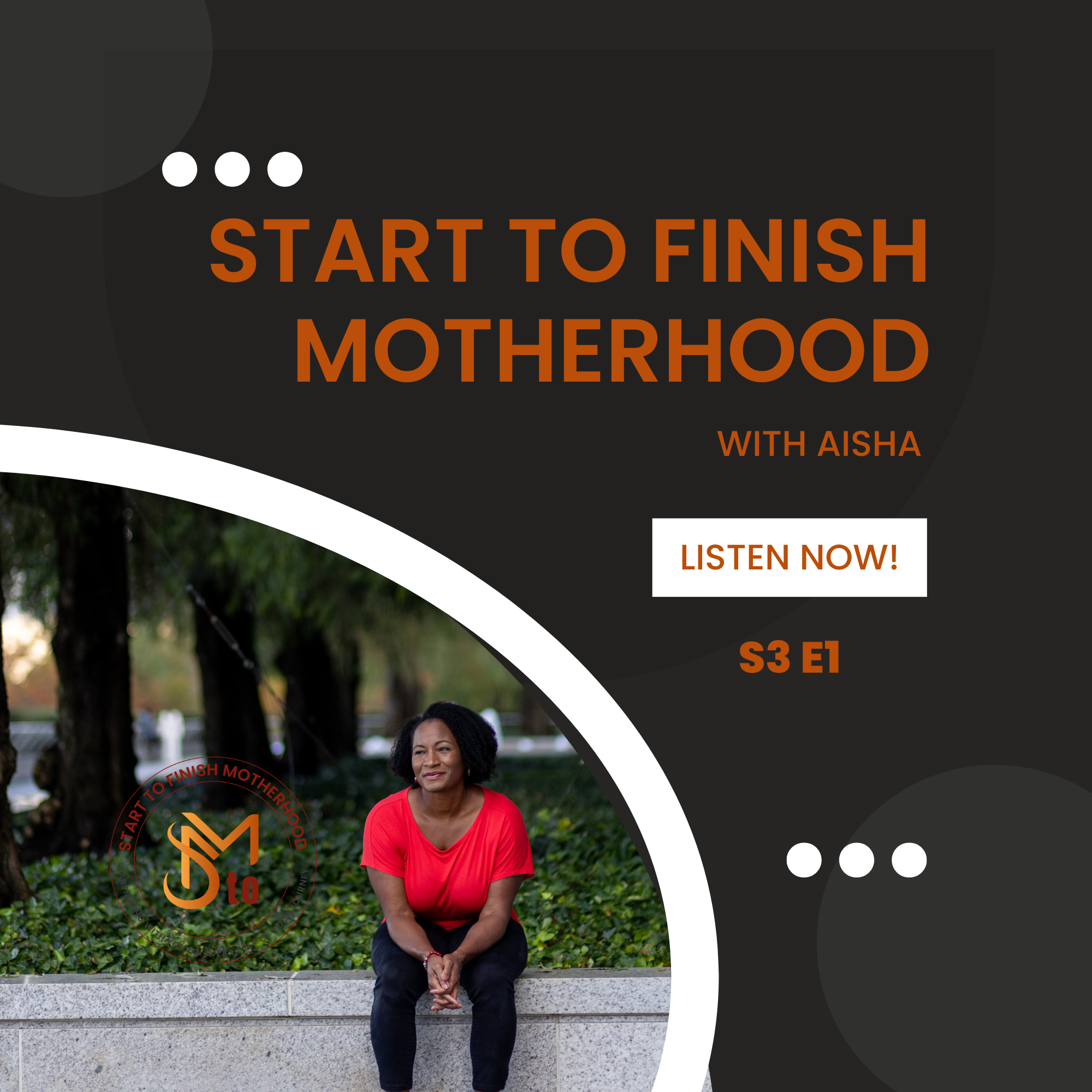Episode Transcript
[00:00:00] Welcome to Start to Finish Motherhood, a podcast for those thinking or already single mothers by choice, just looking for practical advice, but navigating life's relationships. When you decide to have children on your own, it doesn't mean that you're completely alone. I'm Aisha Jenkins, and I'm partnering with you every step of your journey.
/Hey, come here, come here, come here. Let me tell you a little secret. Season two of the Start to Finish Motherhood podcast is going to be amazing. I'm so excited for you all to experience the joy, the human connection, and especially the information that was being shared during the episodes. You asked, and we listened.
This season on Start to Finish Motherhood, we will have a health advocacy episode, dating in the time of social media, a financial literacy episode, An episode on people who are choosing single. We talk about love and loss. We talk about functional medicine, adoption, community building as a single mother by [00:01:00] choice, and so much more.
So if you're not already subscribed to the podcast or the YouTube channel, I say run and do so now. I appreciate it and you deserve it. And in the meantime, listen in on what we have coming in season two of the Start to Finish Motherhood podcast.
Oh and make sure you listen all the way to the end so that you can find out how you can be one of the first notified about the season two premiere date............ take us through what the DM game is, like, what does it mean to jump into somebody's DMs, and then how much good trouble, or bad trouble, could that lead to? ... Yeah, so nowadays sometimes it looks like, if it's on Instagram, you might, you know, like a couple pictures here and there, comment if you're bold enough, and eventually you'll send a message.
It gives kind of stalker vibes to me when I think, but it could just be because of the era that I come from. I have seen some dating profiles where [00:02:00] people will say, Here's my Spotify . Here's my Instagram .
Is that really like a thing? Yes, Aisha, it's a thing. And I can see, of course, the view of it being stalker vibes, because, you might just be talking to someone you don't necessarily want them to add you on Facebook and see your whole family or anything like that.
When we talk about online dating, we're not just talking about the apps, right? We're also talking about utilizing your personal social media profiles, as a form of online dating,
yeah, so it even goes off those dating apps as well. So I know, like I said, my partner, originally reached out to me on Snapchat and it originally started on my school app, where I actually posted something, and, you know, he had seen my photo and recognized me and got my Snapchat off of there.
A lot of the times we see that sometimes people don't necessarily have luck with the dating apps.
Fast forward my mom struggled with mental health and she passed away in 2019 and when she passed, she [00:03:00] did have life insurance, but it lapsed 32 days before she passed. Oh no. Yeah. And you know, it's, it's hard enough when you're grieving. To figure out especially when you're not expecting somebody to pass, especially when you are going through all the emotions of, of grief, right.
And then when you tie in the financial aspect of grief, the importance of having a will and life insurance is very important.
Yes, I am a fiduciary, like several times over. So essentially what a fiduciary means is that you have to sign a fiduciary oath that says that you are bound to do the right thing for your client. You are ethically and legally bound to make sure that you're doing the right thing, so if you're not doing those things on behalf of the board, the client and the profession. You can get not only in big trouble, right, but you can also get your licenses revoked. So, fiduciary really does mean a big deal.
These [00:04:00] tax laws are not, these were not written for us. These are all shelters. All these, these numbers are just tax shelters and laws so that you can save in a tax efficient way, and 529s and FSAs and all the things that we're kind of briefly talking about, they're just tax codes.
But we're going to use what we've got to get where we need to go. We have learned the tricks of the trade and we are going to use them. So that's.
And one person said, you should look into functional medicine. That was the first time I'd ever heard that term. And I looked into it while I was in school, doing my master's, and it once again resonated with me. And I said, yes, this is what I want to do. This makes sense.
Then I had to go back to school to learn functional medicine, pretty much unwire my brain from what, traditional school taught me unlearn some things and relearn some new things on how the body actually works.
There are certain things that are disproportionate in the Black community [00:05:00] and in particular for women. You're hearing people who are trying to get pregnant with PCOS. You hear a lot about fibroids. You hear a lot about premature ovarian failure. You hear about anovulation, obesity, inflammation, endometriosis.
So functional medicine, high level, looks to find the root cause of the issue and optimize your body. Meaning that whatever imbalances may be going on within the body from a cellular level, you know, we want to work on all of those parts right there, all of the different interconnected parts, fix those things.
And here's the beautiful part about our bodies.
I was at work getting ready to leave work and I get a call. Hey, we have these two little girls, they're siblings and. It's just going to be like a two week placement because there's a grandparent. We just need to vet the grandparent and you know, they'll, they'll transition in there and I was like, okay, this is a good little, get my feet wet.[00:06:00]
I jump in. I was like, okay, I get home before the caseworker arrived and shows up with these two little beautiful little white children.
So, you know, I never asked the right. I just assumed that they would be black kids. So I was, you know, I was taking a back, but you know, then you get into, you know, the motherhood mode, it doesn't matter if race at that point, they needed a home and to be taken care of and loved.
I often say that the choice or the decision to take the Single Mother by Choice path is one that is out of love and one that is through a desire to parent children. Period. End of story. And so, yes, every time I hear that part of your story, I'm like, yes, I, I, I know that feeling.
In the beginning, I used to feel the need to always explain or to justify, Oh, well, they're in foster care. You know, they were adopted [00:07:00] and stuff like that, but I overshared. And that's just something that you do as, as foster parents and stuff like that. I've since reeled back and honestly, now I do not get questioned as much.
And I always, I joke and I say that I call it this resting bitch face. But occasionally, you know, I've been at a store and like a cashier, and one time we were at a Goodwill and the cashier was just really like, Oh, they're so beautiful.
Are they with you? And I mean, just really probing, I says, yes, they're my kids. And I, and I don't entertain anymore and I just move on from that. I think people make up like, Oh, well, maybe she's married to a white guy and maybe those are his kids.
I'm assuming that one, I got the acronym correct. Is it, I've seen it as Individual Education Plan or Individual Education Program, so is there a [00:08:00] difference between the two? I think it just depends on the state, like what term is used, but at least in New York it's Individualized Education Program, but plan is also a perfectly fine thing.
And then I was always going around using both IEP and a 504 plan interchangeably, but I've come to learn that they are different
There are two plans you can get in schools to address if your child has special needs or disabilities. One is a 504 plan, which is based on a federal law, section 504. And section 504 is a federal law designed to protect the rights of individuals with disabilities in any programs or activities that receive federal funding.
An IEP, an Individualized Education Plan, is a school based plan that, that is mandated for local education agencies to use through the law IDEA, Individuals with Disabilities Education Act.
Oh, okay. . Well, an IEP is a much more comprehensive [00:09:00] plan. Then a 504 plan, and also, and a student actually could have both, but typically 504 plans are associated more with different types of accommodations that a student might need.
Wasn't a hard pivot for me because I was already thinking this is something that I wanted to do, but I still needed to make sure my mind was right, you don't want to bring a child, whether they're through foster care adoption or private adoption, kinship adoption, you don't want to bring a child and be thinking about this child over here,
but I pivoted and I think it was just sort of more of a smoother transition for me than maybe some other folks have experienced. Yeah, and that part of your story really resonated with me.
I got a few matches, but honestly, they were not real matches for me. I remember going to an adoption party and being the only single Black woman that was there. Nevermind all the children that were running [00:10:00] around in this arcade that looked like me.
The other Black folks that were there, social workers, okay? And then there's me, and then there was a lot of White families. One of the social workers she whispered, You're a unicorn.
I mean, it's just like, we just do not have Black families that come for our adoption events. We do not have a lot of families that are Black that choose to do this. Most of our kids go to white homes or families with white parents. So how did you find out about the adoption event?
I adopted my daughter at birth. I was able to be there for the labor and delivery. I was in the room yelling, push, push, and holding the birth mother's legs and also advocating for her, it was a pretty intense labor.
A lot of stopping, a lot of starting, doctors coming in, doctors going , flurry of people. And so it was clear that she was in some [00:11:00] pain. The baby was also in a bit of distress and then I looked at her.
After the second time when she had basically requested, can we just do a C section, I looked at her, she looked at me, and I looked at the doctors, and I was like, this isn't working, they rushed her into the OR and Justice was born, and she's been with me ever since.
If we're going to have this conversation and we're going to have it in a nuanced way, let's talk about some of the structures that factor into women and in particular, black women having to make choices, choosing the best option to be free.
Give me free. I think those comments are phenomenal I want to talk about one that I remember explicitly, and it was talking about how you like you're the single black woman or the destruction of the black family.
I make two arguments in the book and one argument I thought people were going to give me a lot of pushback against, and they don't. So in a very basic kind of sense, because I am an academic, I have to have theories that kind of inform my research. So I use intersectionality, and what [00:12:00] intersectionality talks about in very basic terms is to say, it's not that I'm a, I'm black and a woman, but I'm a black woman
Was not really, you know, wasn't really the vibe. And so he was going to introduce me as Virginia because Virginia sounds like a proper Southern girl, you know? And so we go to lunch with his parents and he introduces me as Virginia and something that I wouldn't, adult me would never allow. And his father spends the entire time calling me Georgia.
And when I, when I, you good, Chris? Because it's a state? That when I corrected his father, I said, Oh, sir, it's actually Virginia. And he said, well, I knew it was a southern state. And then he called me Georgia two more times before, before lunch ended. And I was like, okay, well, I guess, I guess we're done here,
Singlehood is on the rise. We need to evolve past this whole, heteronormative ideal. It's, it's time, [00:13:00] it's time to leave it in the past. So yeah, we're talking about actually Expanding the conversation to say that SALA, SMC, all of these are valid choices.
These are different family structures that are valid choices with their own pros and cons, their own tax considerations, and these are things that people should consider.
Health maintenance has been something that I have tried to stay on top of since I've had kids, I love that you're on top of this because sometimes it can be hard to make your doctor's appointments. I mean, we're so busy we don't even get our own healthcare stuff taken care of. But this is the best medicine. It's prevention. It's not surprising that you said you didn't know that you were so close to diabetes and you didn't have those symptoms because many times you don't have symptoms.
Our implicit bias plays a role as well with risks because if you're going to see even a well meaning provider, but they don't Understand that some of the things that they have already thinking may apply to how they interact with you or the kind of questions that they ask you, the [00:14:00] time that they spend with you, or if they rush off some of your concerns, that may in itself increase your risk or delay diagnosis of things.
I had three nights and four days all to myself. And let me tell you, you've become a changed person I was feral. Day one, the kids missed me. I missed their little faces.
My four year old called me and she was just like, mommy. I like it here, but I really, really, really miss you. I really miss you. So, so come, come get me. And so it's just like, yes, honey. No. Okay.
I have built up some momentum to actually have an adult play date and the dating pool is just horrible, but funny. That did not happen. It's quite interesting. I had one guy who
Resources can be found on my YouTube channel. I talk a little bit about what led me to become a single mother by choice. I talk about the five stages of being a single mother by choice. You know, [00:15:00] many people and some of your family members might think that you got up one day and decided I'm going to become a single mother by choice.
When I decided to become a single mother by choice, that was a soft life decision. I wanted to make a choice that was going to make my life stress free. I don't have a lot of overhead and external stressors that I have to deal with on a day to day basis.
The stresses that I have to deal with are just my kids and stresses due to my, my work environment, my job. And so making the choice to become a single mother by choice, I wanted no drama. I wanted low stress.
And there you have it. So if you're as excited about season two, as I am. Make sure that you are subscribed to my mailing list. I'll put a link in the chat below. To find out when the premiere date is going to be. All right then until next time. Bye now.
[00:16:00] Thanks for listening to Start to Finish Motherhood with Aisha. If you want to keep the conversation going, follow Start to Finish Motherhood on Instagram or email me at aisha at start to finish motherhood. com. If you love this episode, please share it with anyone who's thinking of becoming a single mother by choice, anyone who's already parenting as a single mother by choice and just looking for advice on navigating it all, or a friend or family member who's looking to support someone else's single mother by choice journey.
Until next time, bye now.


